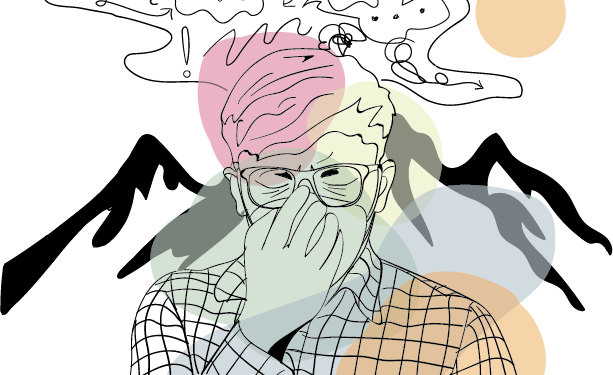11 Dec 2024

Tired Earth
By The Editorial Board

Researcher and professor in the U department of psychiatry Douglas Kondo is one of three authors of the research paper titled “Living High and Feeling Low: Altitude, Suicide, and Depression.” The piece explores the effect increased altitude can have on someone’s mental health.
“The altitude hypothesis has been met mostly with incredulous skepticism, with a little hostility mixed in,” Kondo said. “What’s amazing about that, is that I’ve never spoken to an academic … audience, who disagreed with the idea that your morning run is easier and less taxing at sea level … So given the fact that muscle and brain tissue use the identical enzyme systems to buffer and generate ATP, I never could figure out why the altitude hypothesis encounters so much resistance.”
He said his coauthor, Perry Renshaw, started to make offhand observations that inspired the study when he moved to Utah from the East Coast about the mental health of family, colleagues and friends as they lived in higher altitude.
For the study, they collected suicide data for 20 years and compared it to the topographical data collected from space stations.
“All-cause mortality is inversely correlated with altitude so actually, if you don’t have a psychiatric disorder altitude is correlated with living a longer life, which I think brings the association with suicide into sharper contrast,” Kondo said.
The study also explores the idea that these higher rates of depression can be impacted by “low blood oxygen related to low atmospheric pressure.”
He said functioning on 20% less sleep, water or food would deeply affect someone, subsequently so would functioning on 20% less oxygen.
Kondo and fellow researchers are examining ways to naturally replace “what is lost from the decrease of oxygen.”
He said researchers in Israel are studying ways to deliver more oxygen to people in their sleep to try and combat the effects of lack of oxygen on mental health.
The “altitude story,” as Kondo referred to it, also has to deal with serotonin and metabolism. According to research by Shami Kanekar in the U department of psychiatry, serotonin levels are also decreased at higher altitudes as well as the effectiveness of antidepressant medications that work through serotonin, e.g. SSRIs.
The Intergovernmental Panel on Climate Change released a 2021 report stating that no matter how sharply producers and countries decrease their carbon emissions, the global temperature will increase by 1.5 degrees celsius. The report also said if there is not a coordinated effort to commit to decreasing emissions then the world is in store for an increasingly hot future.
Hannah Taub, a member of Divest U, a group focused on encouraging the U to divest their endowment in the fossil fuel industry, said with the wildfire smoke and other tangible effects of climate change, existential dread can be a struggle.
“That IPCC report [that] just came out … kind of makes it seem like well, 15 years before shit hits the fan,” Taub said.
According to the American Psychological Association, 67% of Americans reported in 2020 being somewhat or extremely anxious about the effect that climate change will have on the environment.
However, Taub said even being able to dwell on climate existential dread is a privilege.
“We have time to sit around or freak out,” she said. “Other people are trying to get water, or refugees because of the climate, like it’s already affecting a lot of people in their day to day life. Existential dread is scary … It’s immobilizing a lot of us, and yet we’re privileged to even be experiencing those emotions.”
Climate disaster also affects mental health. According to the American Public Health Association, 54% of adults and 45% of children experience depression after a natural disaster.
“We should be really creative about ways to teach other people that change can happen, and that all hope is not lost, and also to resist the status quo, like we are living through monumental change [and] it’s really scary,” Taub said. “There’s a lot of unknown, but we are also active agents in that change.”
Taub said one way to avoid falling down the “existential rabbit hole” is to look at research and long-form journalism and not Instagram infographics that select certain facts and are meant to spread fear.
Source : dailyutahchronicle.com
Comment